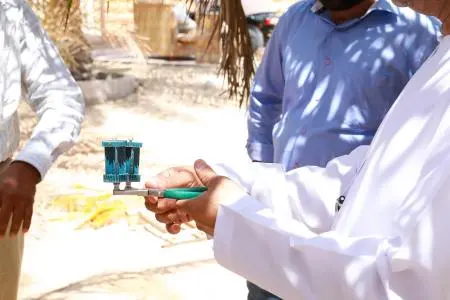PHOTO
Abu Dhabi: During the first half of 2019, Abu Dhabi Agriculture and Food Safety Authority (ADAFSA) has offered intensive technical training to 14,377 farm workers in the Emirate of Abu Dhabi. This represents an increase of about 16.5% over the target number of workers in 2019 training plan, which aims to train about 12,000 Arab and Asian labor during the first half of this year.
Since the beginning of 2019, ADAFSA also carried out about 130,000 visits to the emirate's farms, covering 22,072 farms in Abu Dhabi, Al Ain and Al Dhafra. ADAFSA's visits focused on providing technical support and guidance to farm owners and workers, as well as educating them about the best agricultural practices, modern farming methods and the optimal use of water.
Al Ain farms have captured the largest share of the extension visits, as about 54,741visits to 11,727 farms in Al Ain were made. Meanwhile, ADAFSA extension engineers made 47,160 visits to 7,759 farms in Al Dhafra, and 28,044 visits to 3,179 farms in the Abu Dhabi.
Furthermore, workers of Al Ain farms have made remarkable presence in the training sessions with the participation of about 5,924 of them, at 41.3% of total workers who attended the training. Meanwhile, the sessions were attended by about 5,710 workers from Al Dhafra at 39.7%, and 2,743 workers from Abu Dhabi at 19%.
The training sessions covered eight agricultural-related activities, including on-farm irrigation management training, ways of cultivating and taking care of crops, methods to protect crops from pests, agriculture in greenhouses, organic farming, integrated management of palm trees services, and other activities support the sustainability of the agriculture sector. During the first half of 2019, about 792 training sessions were organized out of the target 1,616 sessions by the end of the year. The training includes field visits to farms and on-farm training workshops to educate workers on the best agricultural practices, modern farming methods and ways for improving farms productivity.
About 49.1% of all implemented training sessions are about the safe ways to spray crops. Some 389 sessions were organized to educate farmers about ways for spraying crops, types and quantities of safe pesticides for each crop, personal protection from pesticides, and ways of using, preserving and discarding pesticides safely according to the best standards. Meanwhile, ADAFSA held 161 sessions to raise awareness of participants about palm trees and date production services, 81 sessions on greenhouses farming, 68 sessions on irrigation, and 39 sessions on crop protection from pests.
In addition, 172 extension engineers from various agricultural disciplines are taking part in implementing the annual training plan for farm workers. They are trained in various agriculture-related fields, including on-farm irrigation management, ways of growing fruit trees, palm trees and date production services, integrated management of palm trees pests, hydroponics, good agricultural practices, improve irrigation systems, and integrated pest management.
In this regard, Eng. Thamer Al Qasemi, ADAFSA's Spokesperson, said that ADAFSA seeks, through its agricultural extension centers across the Emirate, to offer extension and training services and help farmers implement modern agricultural techniques. ADAFSA also provides other services to support the agricultural sustainability and improve farms productivity, which enhances food security and improves farmers' incomes.
"Our responsibility is to develop a sustainable agricultural sector in the Emirate of Abu Dhabi. Therefore, we work with farm owners to modernize farming systems and implement the best international practices. The extension and training programs aim at capacity-building of farm owners and workers, and introducing them to the best ways to grow various types of crops, maintain farm resources' sustainability and enhance farm productivity," Al Qasemi noted.
He added that the implementation of good agricultural practices helps reduce water use, improve soil properties, and improve the quality and quantity of local production. This ensures realize Abu Dhabi Government's priorities to enhance efficiency and sustainability of agriculture natural resources for future generations, improve farmers' income and farm productivity, and increase the agriculture sector's contribution to the Emirate's GDP.
Al Qasemi clarified that ADAFSA has 27 agricultural extension centers near the Emirate farms. They are platforms for providing extension and training services as proactive services, as well as any other services farmers need. He affirmed the keenness of those centers' extension engineers and technicians to fulfill all needs of farm owners and introduce them to the best practices to improve their farms, which helps achieve the desired concepts of agricultural sustainability.
-Ends-
© Press Release 2019Disclaimer: The contents of this press release was provided from an external third party provider. This website is not responsible for, and does not control, such external content. This content is provided on an “as is” and “as available” basis and has not been edited in any way. Neither this website nor our affiliates guarantee the accuracy of or endorse the views or opinions expressed in this press release.
The press release is provided for informational purposes only. The content does not provide tax, legal or investment advice or opinion regarding the suitability, value or profitability of any particular security, portfolio or investment strategy. Neither this website nor our affiliates shall be liable for any errors or inaccuracies in the content, or for any actions taken by you in reliance thereon. You expressly agree that your use of the information within this article is at your sole risk.
To the fullest extent permitted by applicable law, this website, its parent company, its subsidiaries, its affiliates and the respective shareholders, directors, officers, employees, agents, advertisers, content providers and licensors will not be liable (jointly or severally) to you for any direct, indirect, consequential, special, incidental, punitive or exemplary damages, including without limitation, lost profits, lost savings and lost revenues, whether in negligence, tort, contract or any other theory of liability, even if the parties have been advised of the possibility or could have foreseen any such damages.




















